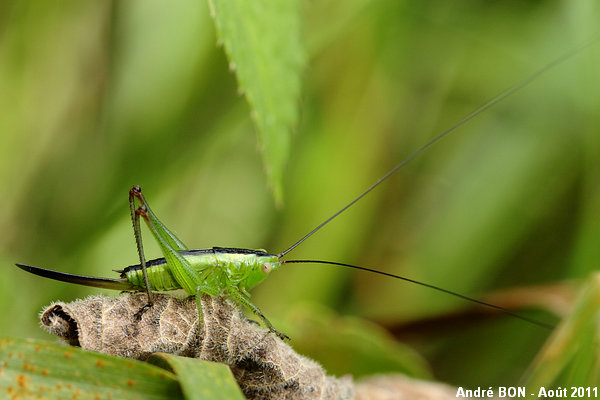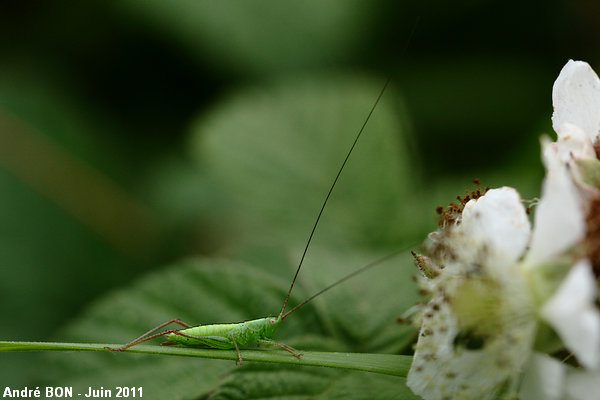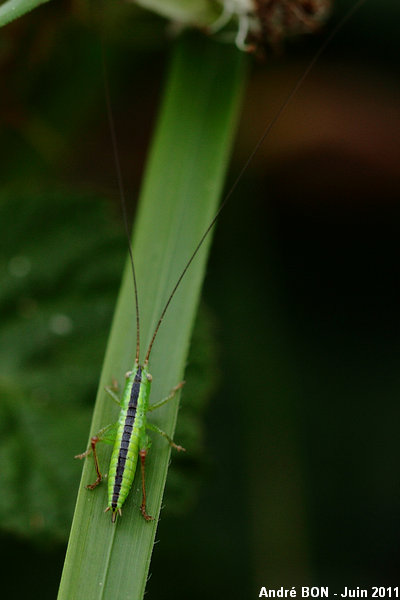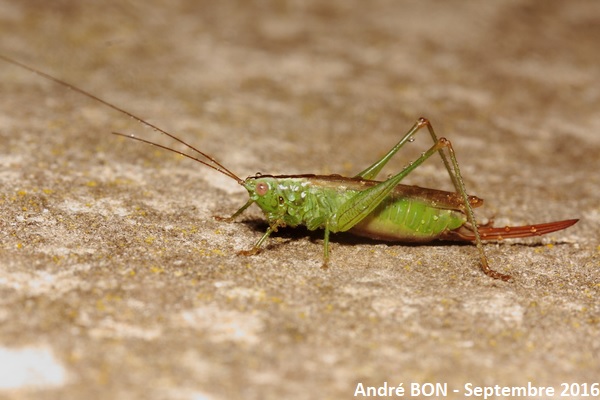









| Long-winged Conehead (Conocephalus fuscus (Fabricius, 1793)) |










|
|
Scientific name: Conocephalus fuscus (Fabricius, 1793) Common name: Long-winged Conehead Other names: Other scientific name: Conocephalus discolor French name: Conocéphale bigarré Order: Orthoptera Family: Conocephalidae Wingspan : 12-19 mm Biotope: High grasses in dry or damp conditions. Geographic area: Europe, Asia east to the Amur river. Observation period : July to October. |
The grasshoppers of the Conocephalus genus are characterized by a conical head with a narrow angle between the face and the top of the head. They have very long antennae and a straight or slightly curved ovipositor. They show a broad brown dorsal stripe. There is a possible confusion of Long-winged Conehead with Short-winged Conehead (Conocephalus dorsalis). Long-winged Conehead's wings are longer than the abdomen while Short-winged Conehead's wings are very shorter (I like English common names, they often include the main keys to tell species apart ...). The female's ovipositor is long (about the same length as the body) and slightly curved (almost straight) on Long-winged Conehead, it is short and curved on Short-winged Conehead. Short-winged Conehead is only found in damp habitats. The Large Conehead (Ruspolia nitidula) does not show any brown dorsal stripe. It appears completely green (sometimes with a thin dorsal line. There is also a brown form). The base of the mandible is yellow-coloured. Females' ovipositor is very straight. |
| [To know more about the Long-winged Conehead] [Next picture] [Top] |

|
The conical head with very long antennae, one brown dorsal stripe, an almost straight ovipositor, we have got one female Conocephalus fuscus. It is not easy to frame the picture not to cut the tip of the antennae! |
| [To know more about the Long-winged Conehead] [Next picture] [Previous picture] [Top] |

|
I think that this one is a juvenile Long-winged Conehead at the last stage just needing one moult to become adult. The long and straight ovipositor confirms the Conocephalus fuscus species. This observation has been done in a damp habitat, on the banks of a pond. |
| [To know more about the Long-winged Conehead] [Next picture] [Previous picture] [Top] |

|
Here is one male Long-winged Conehead. The wings are clearly longer than the abdomen. |
| [To know more about the Long-winged Conehead] [Next picture] [Previous picture] [Top] |

|
Here is a juvenile form of Conocephalus. This observation, done in a dry area, enables me to think that this one is a Long-winged Conehead rather than a Short-winged Conehead. |
| [To know more about the Long-winged Conehead] [Next picture] [Previous picture] [Top] |

|
You can already see the long length of the antennae and the conical head on this juvenile Long-winged Conehead. |
| [To know more about the Long-winged Conehead] [Next picture] [Previous picture] [Top] |

|
Upper side view. |
| [To know more about the Long-winged Conehead] [Next picture] [Previous picture] [Top] |

|
Here is a female which shows very cooperative for the photo. |
| [To know more about the Long-winged Conehead] [Next picture] [Previous picture] [Top] |

|
Here is another female (or the same one as above). It is also very cooperative in front of the amateur naturalist. |
| [To know more about the Long-winged Conehead] [Next picture] [Previous picture] [Top] |

|
View of the head. |
| [To know more about the Long-winged Conehead] [Previous picture] [Top] |

|
View of the ovipositor. |